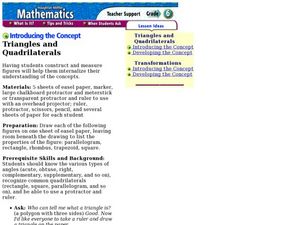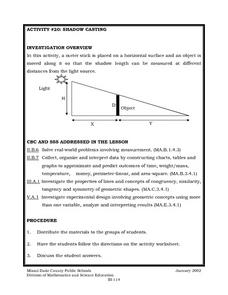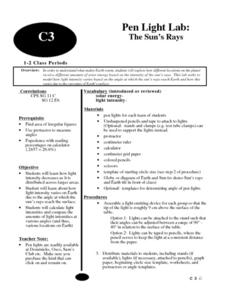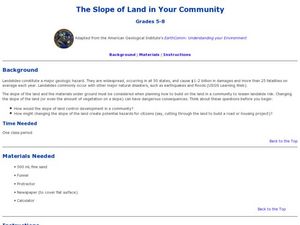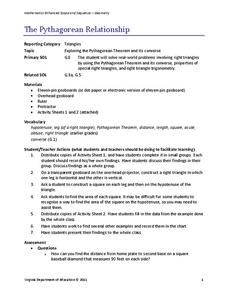Houghton Mifflin Harcourt
Introducing the Concept: Triangles and Quadrilaterals
Guide your geometers through the process of constructing polygons. They learn how to draw triangles, squares, parallelograms, rectangles, rhombuses, and trapezoids with specified angles using a protractor and a ruler. The lesson plan...
Curated OER
Exploring the Definition of Reflection
Students practice using a protractor and ruler to draw various points and lines. Using a computer, they draw the points and lines in the program and describe the differences between their drawing and the computer's drawing. They complete...
Curated OER
Shadow Casting
Eighth graders use a meter stick that is placed on a horizontal surface and an object is moved along it so that the shadow length can be measured at different distances from the light source. They solve real-world problems involving...
Curated OER
Comparing Roots After Rotation of Ninety Degrees
Students conduct an experiment and use different measurements of a single root to illustrate the mechanism of plant movement.
Curated OER
Identify Similar Figures
Students explore the concept of similar figures. For this similar figures lesson, students develop the idea that similar figures are a different size but the same shape by comparing similar rectangles. Students use patty paper to trace...
Curated OER
There's Gotta Be An Angle
Students examine the external variables that affect a downhill skier in the quest for speed. They access websites imbedded in this plan to become ski teams competing against one another. Each team presents results of all experiments.
Curated OER
Perfection on Ice!: Math, Geometry, Fibonacci Numbers, Olympics
Students use the human body as a foundation for gaining practice in measuring angles and calculating ratios and proportions.
Curated OER
Pen Light Lab
Young scholars study what makes Earth warm and explore how different locations on the planetreceive different amounts of solar energy based on the intensity of the sun's rays. They calculate light intensities and compare the
amounts of...
Curated OER
Automobile-Accident Reconstruction
Students investigate an accident and relate it to math. In this trigonometry lesson, students measure the accident scene, the friction produced, and the speed from the skid marks. They create a poster of their findings.
Curated OER
Pythagorean Theorem
For this geometry worksheet, 10th graders solve for missing sides and angles of a triangle. They use the pythagorean theorem to solve for the unknown in a right triangle. There are 5 questions on this worksheet.
Curated OER
Potato Launcher Energy Lab
Learners investigate conservation laws using a potato launcher. In this physics lesson, students measure angles, time and distance of the potato. They discuss applications of experiments like this.
Curated OER
Measurement via Triangulation
Students utilize triangulation techniques to determine altitudes of objects. An altitude locator is constructed and used to determine the height of a building or a tree. Tangent tables and formulas provide the ratio for the formula to...
Curated OER
The Slope of Land in Your Community
Learners participate in finding the slope of a sand pile and then other materials. In this geology lesson, students describe what happens to the piles of materials when they are poured through a funnel. Learners measure the slope using a...
Curated OER
Quadrilaterals: Four-sided Figures
Fifth graders engage in a variety of hands-on and technology-rich activities involving the classification of quadrilaterals. They utilize protractors and rulers to investigate the characteristics of various types of quadrilaterals. They...
Curated OER
Similarity
Students find the factor of proportionality in similar polygons. In this similarity of polygons lesson plan, students measure the sides and angles of polygons and derive a factor of proportionality between corresponding pairs of sides...
Curated OER
Triangle Conjectures
Tenth graders investigate the theorems of ASA, AAS, AAA and ASA. In this geometry instructional activity, 10th graders discuss the theorems of triangles and how it is used to solve for missing sides or angles. They review how two angles...
Curated OER
Watch Out for Landslides
Students conduct an experiment. In this landslides lesson, students learn about landslides and discuss how they could minimize the risk of landslides. Students complete an experiment to see if changing the slope of the land...
Curated OER
Adhesives: How Sticky is Your Tape?
Students test the adhesive strength of different tapes. In this adhesive lesson, students conduct an experiment to test the shear strength of the adhesives, take measurements, record data, and draw conclusions to explain each product's...
Curated OER
Look At Those Leaves!
Students observe, measure and sort leaves. In this leaf lesson students divide into groups and observe the different kinds of leaves.
Virginia Department of Education
The Pythagorean Relationship
Add up areas of squares to discover the pythagorean relationship. Small groups create right triangles with squares along each side. They calculate the areas of each square and notice the relationship. Groups construct other types of...
EngageNY
Converse of the Pythagorean Theorem
Discover a new application of the Pythagorean Theorem. Learners prove and apply the converse of the Pythagorean Theorem in the 17th lesson in a 25-part series. The examples ask learners to verify right triangles using the converse...
Curated OER
Reflection Experiments
Seventh graders investigate with light rays. In this light lesson plan, 7th graders determine the angle of reflection using simple materials. They continue the investigation by exploring the theory that light which is not reflected or...
Curated OER
Red October
Fourth graders follow directions given in bearings. They invent their own maps using them and use a protractor to help them with their designs. Students
produce their own maps with instructions for navigating the maps. The channels...
Curated OER
Altitude Locator
Young scholars use protractors, strings, and straws to construct a device used to determine the height of tall objects. In this applied geometry lesson, students use common objects to construct a tangent height guide. They use principles...
